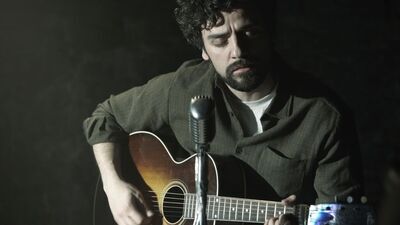
His overarching, general demeanor is what makes his final passionate performance of “Fare Thee Well” all the more powerful, as it indicates a performer uninhibited by prior restraint—a man changed and shaped by grief and moving past it. He’s playing an old song with new eyes and in new tones. The skill is the same, but the vigor channeled into it vastly differs from previous performances. He plays with lyrics, changing them from the recorded version, and with structural form as he holds out certain growling notes. It’s startling how alive the piece is when thus far in his journey he’s carried on by a dejected pull of a string, strung taut with shoulders hunched as though he’s weathered the worst type of chill. Death of a dream has, in some regards, allowed him a momentary rebirth. Fitting, considering the line he speaks at the start of the film that both works as a deconstruction of folk music as well as Llewyn’s character.
“If it was never new, and it never gets old, then it’s a folk song.”
The audition with Bud Grossman encapsulates the entirety of what makes “Inside Llewyn Davis” such an emotionally turbulent story. For all of the film’s acidic bite and its dark humor, there’s an oppressive sense of mourning that takes hold from the very start. It began with the death of his friend. And as he chases the remnants of possibility, he comes to realize that his journey was for nothing. It might not offer him his big break but “The Death of Queen Jane” is Llewyn’s acceptance stage of grief, both for his friend and, most notably, the acceptance of his dying career. With its depressive finality and lyrics that beg for a person to be separated from something—or someone—they love, the longing of the song becomes an act of closure for an artist who has been out in the cold, in wet shoes and no coat, for too long.
Llewyn can’t completely outrun his natural instincts, but he can adjust and make allowances for small but significant acceptances. The film deals with the idea that there are no neat conclusions to these journeys. We accept that those who have died are gone; we accept that our careers aren’t shaping up the way we imagined and that we’ve aged—maybe we even learn from them a bit—but human nature dictates a level of cyclical missteps, of bruised and wounded ego in the face of those assertions. A film about an artist mourning when music and even life was something he loved, “Inside Llewyn Davis” bakes that unflinching grief into its very DNA.

